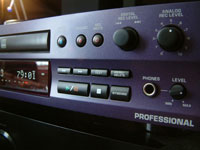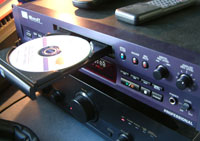|
Mastering the art.
 |
As with cassette ministries, the process
begins with recording a master. There are two ways in which
this can be accomplished. Recordings can be made directly
to the hard-drive of a computer, and although setting this
up initially is a little complicated, it has a number of advantages.
CD's can only store 74 minutes of audio ( 80 minute discs
are available, but not compatible with all players). For most
people, this means their service will need a little bit of
editing - leaving out the offering is a favourite time saver!
With a computer based system it is relatively easy to record
the entire service, and edit it in the computer afterwards
to fill the disc, before "burning" a master. (The
term "burn" is used, because in fact this is what
happens - a laser beam burns a dye inside the blank CD). This
is all very well for those who are computer literate, but
a rather daunting prospect for others who are quite happy
with "press play and record together at the start of
the service" as their most technical instruction. Fortunately
the second solution will be very familiar to these operators
- the dedicated CD recorder.
 |
CD recorders are designed to look like,
and behave like, conventional hi-fi cassette decks. They are
almost as easy to use. Drop a blank CD in the drawer and close
it, press the "record" button, wait a few seconds
while the machine gets the disc ready, and press the play/pause
button to begin. Stop and start using the play/pause button
just as you do on most cassette decks, and press stop at the
end. The only major difference is that when you have finished,
the disc needs to be "finalised" - which usually
means pressing the "finalise" button, pressing play,
and waiting for about two minutes for the operation to complete.
At that stage, you've got a finished CD, ready to play in
any ordinary CD player.
>
Duplication
|